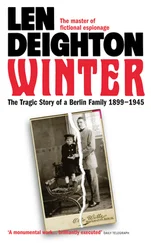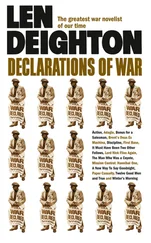The Commissioner’s office was more or less unchanged from the old days. The massive mahogany desk was placed in the corner. The chair behind it stood in the tiny circular turret that provided light from all sides, and a wonderful view of the river. There was a big marble mantelpiece and on it an ornate clock that struck the hour and half-hour. A fire blazed in the bow-fronted grate between polished brass fire-irons and a scuttle of coal. The only apparent change was the shoal of fish that swam across the far wall, in glass-fronted cases, stuffed, and labelled with Fritz Kellerman’s name, and a place and date, lettered in gold.
There were two men in army uniform there when Douglas entered the room. He hesitated. ‘Come in, Superintendent. Come in!’ called Kellerman.
The two strangers looked at Douglas and then exchanged affirmative nods. This Englishman was exactly right for them. Not only was he reputed to be one of the finest detectives in the Murder Squad but he was young and athletic looking, with the sort of pale bony face that Germans thought was aristocratic. He was ‘Germanic’, a perfect example of ‘the new European’. And he even spoke excellent German.
One of the men picked up a notebook from Kellerman’s desk. ‘Just one more, General Kellerman,’ he said. The other man seemed to produce a Leica out of nowhere and knelt down to look through its viewfinder. ‘You and the Superintendent, looking together at some notes or a map…you know the sort of thing.’
On the cuffs of their field-grey uniforms the men wore ‘Propaganda-Kompanie’ armbands.
‘We’d better do as they say, Superintendent,’ said Kellerman. ‘These fellows are from Signal magazine. They’ve come all the way from Berlin just to talk to us.’
Awkwardly Douglas went round to the far side of the desk. He posed self-consciously, prodding at a copy of the Angler’s Times . Douglas felt foolish but Kellerman took it all in his stride.
‘Superintendent Archer,’ said the PK journalist in heavily accented English, ‘is it true that, here at Scotland Yard, the men call General Kellerman “Father”?’
Douglas hesitated, pretending to be holding still for the photo in order to gain time. ‘Can’t you see how your question embarrasses the Superintendent?’ said Kellerman. ‘And speak German, the Superintendent speaks the language as well as I do.’
‘It’s true then?’ said the journalist, pressing for an answer from Douglas. The camera shutter clicked. The photographer checked the settings on his camera and then took two more pictures in rapid succession.
‘Of course it’s true,’ said Kellerman. ‘You think I’m a liar? Or do you think I’m the sort of police chief who doesn’t know what goes on in my own headquarters?’
The journalist stiffened and the photographer lowered his camera.
‘It’s quite true,’ said Douglas.
‘And now, gentlemen, I must get some work done,’ said Kellerman. He shooed them out, like an old lady finding hens in her bedroom. ‘Sorry about that,’ Kellerman explained to Douglas after they’d gone. ‘They said they would need only five minutes, but they hang on and hang on. It’s all part of their job to exploit opportunities, I suppose.’ He went back to his desk and sat down. ‘Tell me what’s been happening, my boy.’
Douglas read his report, with asides and explanations where needed. Kellerman’s prime concern was to justify money spent, and Douglas always wrote his reports so that they summarized the resources of the department and showed the cost in Occupation Marks.
When the formalities were over, Kellerman opened the humidor. With black-market cigarettes at five Occupation Marks each, one of Kellerman’s Monte Cristo No 2s had become a considerable accolade. Kellerman selected two cigars with great care. Like Douglas, he preferred the flavour of the ones with green or yellow spots on the outer leaf. He went through a ceremony of cutting them and removing loose strands of tobacco. As usual Kellerman wore one of his smooth tweed suits, complete with waistcoat and gold chain for his pocket watch. Typically he had not worn his SS uniform even for this visit by the photographer. And Kellerman, like so many of the senior SS men of his generation, preferred army rank titles to the cumbersome SS nomenclature.
‘Still no word of your wife?’ asked Kellerman. He came round the desk and gave Douglas the cigar.
‘I think we have to assume that she was killed,’ said Douglas. ‘She often went to our neighbour’s house during the air attacks, and the street fighting completely demolished it.’
‘Don’t give up hope,’ said Kellerman. Was that a reference to his affair with the secretary, Douglas wondered. ‘Your son is well?’
‘He was in the shelter that day. Yes, he’s thriving.’
Kellerman leaned over to light the cigar. Douglas was not yet used to the way that the German officers put cologne on their faces after shaving and the perfume surprised him. He inhaled; the cigar lit. Douglas would have preferred to take the cigar away with him but the General always lit them. Douglas thought perhaps it was a way of preventing the recipient selling it instead of smoking it. Or was it simply that Kellerman believed that, in England, no gentleman could offer a colleague a chance to put an unsmoked cigar in his pocket.
‘And no other problems, Superintendent?’ Kellerman passed behind Douglas, and touched the seated man’s shoulder lightly, as if in reassurance. Douglas wondered if his general knew that his internal mail had that morning included a letter from his secretary, saying she was pregnant and demanding twenty thousand O-Marks. The pound sterling, she pointed out, in case Douglas didn’t know, was not the sort of currency abortionists accepted. Douglas was permitted a proportion of his wages in O-Marks. So far Douglas had not discovered how the letter got to him. Had she sent it to one of her girlfriends in Registry, or actually come into the building herself?
‘No problems that I need bother the General with,’ said Douglas.
Kellerman smiled. Douglas’s anxiety had led him to address the general in that curious third-person form that some of the more obsequious Germans used.
‘You knew this room in the old days?’ said Kellerman.
Before the war it had been the Commissioner’s procedure to leave the door wide open when the room was unoccupied, so that messengers could pass in and out. Soon after being assigned to Scotland Yard, Douglas had found an excuse for coming into the empty room and studying it with the kind of awe that comes from a schoolboy diet of detective fiction. ‘I seldom came here when it was the Commissioner’s room.’
‘These are difficult times,’ said Kellerman, as if apologizing for the way in which Douglas’s visits were now more frequent. Kellerman leaned forward to tap a centimetre of ash into a white china model of Tower Bridge that some enterprising manufacturer had redesigned to incorporate swastika flags and ‘Waffenstillstand. London. 1940’ in red and black Gothic lettering. ‘Until now,’ said Kellerman, choosing his words with care, ‘the police force has not been asked to do any political task.’
‘We have always been completely apolitical.’
‘Now that’s not quite true,’ said Kellerman gently. ‘In Germany we call a spade a spade, and the political police are called political police. Here you call your political police the Special Branch, because you English are not so direct in these matters.’
‘Yes, sir.’
‘But there will come a time when I can no longer resist the pressure from Berlin to bring us into line with the German police system.’
‘We English don’t take quickly to new ideas, you know, sir.’
Читать дальше












